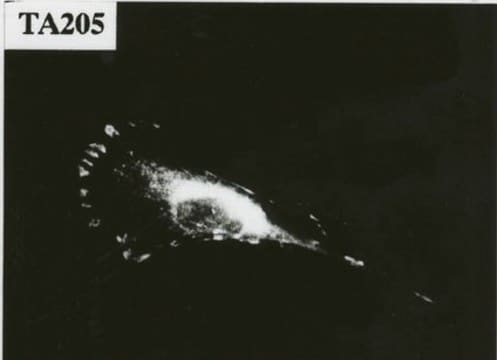B3310
e coli protein expression
for protein expression and DNA plasmid production
Synonim(y):
BL21 Competent Cells, BL21 (DE3)pLysS-T1R Competent Cells
Zaloguj sięWyświetlanie cen organizacyjnych i kontraktowych
About This Item
Numer MDL:
Kod UNSPSC:
12352200
Polecane produkty
klasa czystości
for molecular biology
Postać
suspension
Warunki transportu
dry ice
temp. przechowywania
−70°C
Opis ogólny
BL21(DE3)pLysS-T1R are competent E. coli that are suitable for high level induction and expression genes regulated by expression vectors with T7 promoter. The cells have transformation efficiency of ≥5x106 cfu/μg when transformed with non-saturating amounts of pUC19 plasmid DNA.
Sigma′s BL21-T1R competent E. coli cells are grown and made chemically competent using an optimized procedure specific to the strain, followed by strain verification and efficiency testing. The cells are provided in frozen 50 μl aliquots for convenience. Each aliquot can be used for a single transformation.
Zastosowanie
Suitable for induction and expression of genes directed by the expression systems with T7 promoter
Cechy i korzyści
- Ensures induction and expression of genes from any T7-promoter based expression system
- Contains the genotype tonA that protects the clonal stocks from lytic bacteriophages
- Contains T7 RNA polymerase that is inducible by addition of IPTG to the culture
- Renders resistance to chloramphenicol; useful for selection process
- Allows compatibility with plasmids containing ColE1 or pMB1 origin
- Guaranteed high transformation efficiency
- Convenient 50 μL aliquots
Komponenty
- BL21(DE3)pLysS-T1R chemically competent cells, 10 X 50 μL (B3185)
- pUC 19 control DNA (10 ng/μL), 10 μL (D2567)
Zasada
BL21(DE3)pLysS-T1R does not express ion proteases and outer membrane protease, ompT. This prevents the degradation of heterologous proteins expressed by T7 expression vector systems. This strain also contains tonA genotype that confers resistance to lytic bacteriophages such as T1 and T5. The strain is lysogenic for lambda prophage and contains an inducible T7 RNA polymerase regulated by lacUV5 promoter. T7 lysozyme produced by the pLysS plasmid inhibits T7 polymerase that improves transcriptional control.
This page may contain text that has been machine translated.
produkt powiązany
Numer produktu
Opis
Cennik
Kod klasy składowania
10 - Combustible liquids
Temperatura zapłonu (°F)
Not applicable
Temperatura zapłonu (°C)
Not applicable
Certyfikaty analizy (CoA)
Poszukaj Certyfikaty analizy (CoA), wpisując numer partii/serii produktów. Numery serii i partii można znaleźć na etykiecie produktu po słowach „seria” lub „partia”.
Masz już ten produkt?
Dokumenty związane z niedawno zakupionymi produktami zostały zamieszczone w Bibliotece dokumentów.
F W Studier et al.
Journal of molecular biology, 189(1), 113-130 (1986-05-05)
A gene expression system based on bacteriophage T7 RNA polymerase has been developed. T7 RNA polymerase is highly selective for its own promoters, which do not occur naturally in Escherichia coli. A relatively small amount of T7 RNA polymerase provided
T A Phillips et al.
Journal of bacteriology, 159(1), 283-287 (1984-07-01)
The product of the pleiotropic gene lon is a protein with protease activity and has been tentatively identified as protein H94.0 on the reference two-dimensional gel of Escherichia coli proteins. Purified Lon protease migrated with the prominent cellular protein H94.0
Host specificity of DNA produced by Escherichia coli: bacterial mutations affecting the restriction and modification of DNA.
W B Wood
Journal of molecular biology, 16(1), 118-133 (1966-03-01)
Nasz zespół naukowców ma doświadczenie we wszystkich obszarach badań, w tym w naukach przyrodniczych, materiałoznawstwie, syntezie chemicznej, chromatografii, analityce i wielu innych dziedzinach.
Skontaktuj się z zespołem ds. pomocy technicznej








